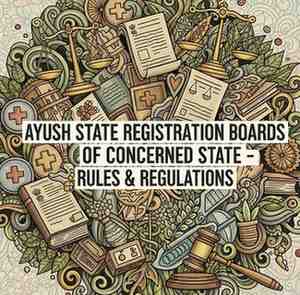
Your Account
Designed by Zeptt Technologies

The AYUSH State Registration Boards are constituted under respective State Acts to regulate the practice and education of Ayurveda, Yoga & Naturopathy, Unani, Siddha, and Homoeopathy.
These bodies function under the guidance of the Ministry of AYUSH, Government of India.
The main aim is to maintain a registry of qualified practitioners, ensure professional ethics, monitor malpractice, and uphold standards of traditional medical systems.
AYUSH REGISTRATION BOARD – PURPOSE AND ROLE
To register qualified practitioners of Ayurveda and other AYUSH systems.
To maintain an updated live register of medical practitioners.
To issue registration certificates that legally allow practice in a state.
To investigate cases of professional misconduct and malpractice.
To coordinate with the Ministry of AYUSH and Central Council of Indian Medicine (CCIM)/National Commission for Indian System of Medicine (NCISM).
To implement state rules regarding ethical practice, education standards, and practitioner conduct.
IMPORTANT RULES AND REGULATIONS
Registration is mandatory for legal practice of Ayurveda and allied systems.
Practitioner must hold a recognized degree/diploma from an institution approved by NCISM.
Renewal of registration may be required periodically (every 5 years or as per state regulations).
Each practitioner must abide by the Code of Ethics prescribed by the NCISM.
Misrepresentation of qualification or practice without registration is a punishable offence.
Illegal practice, quackery, or impersonation can lead to cancellation of registration and legal action.
TYPICAL REGISTRATION PROCESS (STATE-SPECIFIC)
Submission of application form along with degree certificate, proof of identity, and fees.
Verification of documents by the board.
Issue of Registration Certificate with a unique number.
Registration entered in the State Medical Register.
Some states conduct online registration and renewal via AYUSH portals.
LEGAL PROVISIONS UNDER WHICH BOARD FUNCTIONS
Drugs and Cosmetics Act, 1940 (particularly in case of Ayurvedic medicines).
Indian Medicine Central Council Act, 1970 (Now replaced by NCISM Act, 2020).
NCISM Act, 2020 – For maintaining educational and professional standards.
Clinical Establishments (Registration and Regulation) Act, 2010 – Applicable in states that have adopted this act for AYUSH institutions.
MODERN LEGAL AND TOXICOLOGICAL ASPECTS (FORENSIC RELEVANCE)
AYUSH practitioners are not legally permitted to practice modern allopathic medicine unless permitted by state orders or bridge courses (e.g., in emergency cases).
Misuse or misbranding of Ayurvedic drugs falls under Section 33EEC to 33EEI of Drugs and Cosmetics Act.
AYUSH doctors may be summoned as expert witnesses in medico-legal cases involving Ayurvedic drugs or therapies.
Cases of malpractice, negligence, or death due to toxic herbs are increasingly under forensic scrutiny.
Poisonous herbs (Vishadravyas) must be handled with utmost care; AYUSH boards issue guidelines for the same.
Practitioners must keep proper case records and informed consent, especially in procedures like Kshara Karma, Agnikarma, Panchakarma, and Raktamokshana.
SANCTIONS AND DISCIPLINARY ACTIONS
Boards have powers to suspend or cancel registration if:
Conviction of a criminal offence.
Gross negligence or misconduct.
Violation of ethical guidelines or state rules.
Inquiry committee is often constituted for such actions.
Right to appeal is available with the respective appellate authority.
IMPORTANT SANSKRIT REFERENCES
चरकसंहिता सूत्रस्थान ३०/२६
"न त्वनभिज्ञोऽगदेष्वगदं युक्तमुपद्यते।"
“A person who is not skilled in Agada (toxicology) should not administer antidotes.”
(Emphasizing the importance of regulated and qualified practice.)
सुश्रुतसंहिता सूत्रस्थान १/८
"शास्त्रज्ञो यस्तु दक्षश्च शुचिर्दक्षसमाहितः।
वाग्मी जितेन्द्रियः शूरः स भिषक्त्वार्ह उच्यते॥"
A physician must be well-versed in shastra, skillful, disciplined, and of ethical conduct.
ROLE OF CENTRAL AND STATE GOVERNMENTS
The Ministry of AYUSH sets national policies and standards.
State governments implement acts, set up registration boards, and regulate education and hospitals.
Boards act as a bridge between the central authorities (like NCISM) and the grassroots practitioners.
CODE OF ETHICS FOR AYUSH PRACTITIONERS
Practitioners must not claim false cures.
Should not indulge in advertisements or self-promotion violating professional dignity.
Must report adverse drug reactions or outcomes.
Should maintain patient confidentiality and medical records.